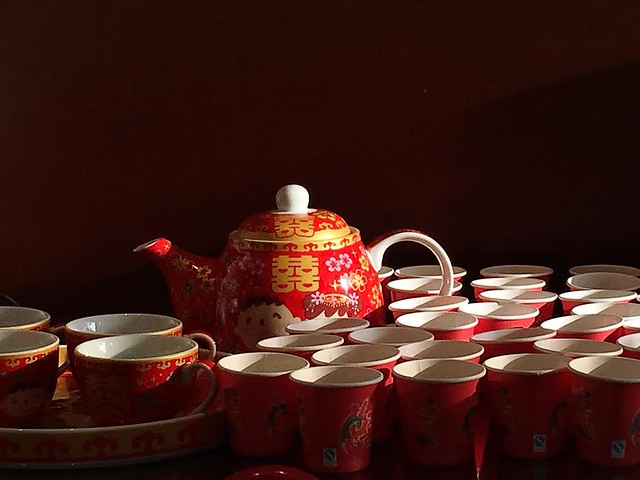
I had a dream last night that I was allowed to run for office in Taiwan.
My district was an amusement park which seemed to be swathed in eternal night. I ran on a pro-marriage-equality, pro-immigration, pro-womens-rights platform (to get the NHI to cover birth control mostly).
My opposition published a "scientific" graph titled "How obnoxious Jenna Lynn Cody is" where the x-axis was time and the y-axis was "obnoxiousness quotient". It had several lines on it including "loves gays", "hates traditional Chinese culture" and one mysteriously called "Jenna Lynn Cody is such a fucking bitch who hates men". Of course, all the lines showed an upward trajectory.
Below it was a low-quality meme with words on it that said "Jenna Lynn Cody's obnoxiousness has grown by #13.5!" (with the hashtag).
So I'm standing in this dark amusement park with all of these 老兵 (retired soldiers) looking at this glossy leaflet with this graph on it, and everyone is looking at me, and I say "if these are the people calling me names, I take it as a compliment."
And the 老兵 went "boo!" and some people on the ferris wheel went "yay!" and I woke up.
It struck me as I struggled awake that it no longer seems totally bonkers for a political faction to publish "data" like that with a straight face.
I'll let you draw your own conclusions regarding connections between my dream above and my point below.
* * *
It's been a couple of weeks since someone was a garbage can to me online - that is, a man insulting me as a woman in ways that men specifically insult women - but I see it happening to my friends too.
And it's being done to them by friends-of-friends. That is, other expat* women in Taiwan being treated like crap by expat men in Taiwan that we might not like, and certainly don't spend time with in real life, but with whom we share many mutual friends - most of them male. I don't see it all the time, as I've blocked the worst offenders. This is itself a problem, as I can't support other women being treated like dirt if I can't see it happening.
So I get ridiculous insults thrown at me, or other women get insults thrown at them (often out of the blue, completely unrelated to whatever was posted/said, or often diving straight to a set of unfair assumptions without thinking). It goes without saying that the woman being treated this way is absolutely capable of handling herself, and doesn't need a man to "step in" and "defend" her like a victim or wilting flower. None of these women are shrinking lilies in need of protection.
And yet, when nobody comes in to voice their support and hold the men accountable, women get ganged up on, and to some people, that starts to look like proof that the harassers are right and the woman is wrong. It doesn't help that, as capable of defending herself as every one of these women is, it doesn't mean much when the men in question simply don't respect anything that woman - or often, any woman - says.
It's happened to me for sure, so I know how that dynamic works.
So far, it's only been verbal in my case, but sometimes real physical assault is involved.
When the women have often blocked these men, and the other men stay silent, that's how it always seems to go down.
Days later (or even sometimes on the same day), I see those same men who are being total garbage cans to women engaging with my male friends online - good men, all - and being treated normally. Complimented, joked with, thanked for offers of help, being engaged in plans to meet, treated as though nothing just happened, or has been happening. They quite literally get a free pass after being asshats to these guys' female friends.
I have, at times, brought this up to more than one male friend - this is by no means an isolated phenomenon - and gotten replies like "Really....him?" "But he's actually a really nice guy." "Yeah, that's how he is, but if I step in..." "It's not for me to say..."
Nothing ever changes. There are no real consequences. The expat men who treat women - mostly expat women, they seem to be nicer to Taiwanese women - like garbage get to continue, with no loss of friends, no diminishment of their reputation, no falling in standing in the expat community.
I want to add here that this doesn't describe all of my male friends, and it doesn't describe anybody all of the time. Some of them will hold men they don't know in person accountable, but not ones they do - perhaps it's a bridge too far to jeopardize a chummy in-person relationship. Some don't fall into this category at all, and really try their best to be great allies.
I don't want to insist that the expat men of Taiwan have to treat other expat men exactly as I would like them to, or that they are immediately beholden to cutting out of their lives anyone who has pissed me or another woman off. That's not reasonable, in the same way that it's never okay to ask your friends to choose between you and someone you hate.
It's especially difficult to ask for in such a small community - everybody knows everybody, or has mutual friends. Frankly, if I meet an expat and we share no mutual friends at all, it sets off a red flag. Even if you live a mostly local life, if you're an expat, you're an expat - there is a real social cost to holding shitty people accountable when those same shitty people may be at the bar that weekend, or the event next weekend, or the party the weekend after that, or your future coworker, or whatever. It's a tough situation because in such a village-like atmosphere there's no real escape (and I'm not a fan of villagers-with-torches-and-pitchforks style justice, anyway).
This is also why it's more noticeable here. It happens where I come from too, all the time, but it's easier to avoid - if I can't deal with a toxic man in one friend group in the US, I could always take some time away and spend more time with another friend group who wouldn't know him at all. Here, everyone knows everyone, and there is no "I don't know that guy" group.
But I would like to see some accountability. Maybe a bit more "dude we're friends so I'm going to be honest - you just treated ______ like crap and that's not okay. Do better." Or not saying "you're so great / you're so cool / you're the best" while a bunch of us are sitting here thinking "no, he's not that great, he literally just went off on ___________ for no reason."
What happens, though, is that there are no real consequences for these men, who then think their behavior is acceptable (again, making it look quite unfairly as though it is the women's fault, not theirs), and everyone but the women gets to go on enjoying a smooth and happy social life. Whereas the women might think, "ugh, do I really want to go out tonight? He might be there, and nobody will have my back. I might even be pressured to be nice to him." So there's no social downside to being a crap dude who's crap to women, but plenty of social downsides for being a woman who doesn't want to deal with being treated that way.
It creates a whole host of social tripwires, a whole chessboard of thinking "____ is a friend but he doesn't really have my back and do I really want to deal with that right now" - so that the only consequences are borne by the women.
I'm not sure what else to say, or how to meaningfully address this problem. I can't force people to act the way I want them to. All I can do is point out that there absolutely is a problem.
*I'm using "expat" loosely here. Some of us are expats, others immigrants, but I don't know what everyone's end game is: whether they'll stay in Taiwan forever or eventually move away. I am referring to the community that includes foreign professionals and some students, and their circles.
*I'm using "expat" loosely here. Some of us are expats, others immigrants, but I don't know what everyone's end game is: whether they'll stay in Taiwan forever or eventually move away. I am referring to the community that includes foreign professionals and some students, and their circles.






